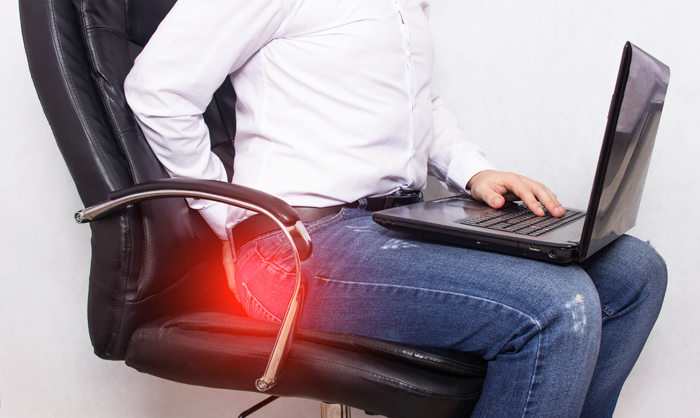Piles Treatment & Surgery in Alwarpet, Chennai
Piles, referred to as hemorrhoids, are bulged or swollen blood vessels in the lowest section of your anus and rectum. It happens due to increased pressure, and the walls of these parts stretch so much that they get inflamed.
Hemorrhoid removal surgery or piles surgery helps in removing these vessels.

What Are the Types of Haemorrhoids?
The different types of hemorrhoids that doctors remove with the help of piles surgery are:
- Internal hemorrhoids: This type develops inside the lining of the lower rectum and anus. They are located deep inside and therefore are not visible. You do not feel much pain because there are few pain-sensing nerves here. But, you may feel some irritation if you put pressure while passing stool.
- External hemorrhoids: These hemorrhoids form in the area near your anus, beneath the skin. These are painful because there are many pain-sensing nerves here.
- Thrombosed hemorrhoids: If blood gathers in external hemorrhoid and grows into a clot, it is a thrombosed hemorrhoid.
Who Qualifies for Piles Surgery?
People who have not benefited from the other ways of treatment may have to undergo a piles surgery.
The symptoms of hemorrhoids can be highly discomforting and affect your regular bowel movements. You may feel severe pain near your anus, bleeding, swelling, a hard lump in the vicinity of your anus, and more. At this juncture, your doctor will recommend you a piles procedure.
Why is Piles Surgery Conducted?
Hemorrhoid removal surgery is the most effective form of treatment for treating piles. It is beneficial for people who experience the symptoms of piles and do not respond to other ways of treatment.
The purpose of this surgery is to either shrink the hemorrhoids or to make them disappear by:
- Cutting their blood supply.
- Removing them using surgical instruments.
What are The Different Types of Piles Surgery?
If gels, ointments, and other remedies fail, surgical intervention becomes essential for piles. The various types of hemorrhoids surgery are:
- Haemorrhoidectomy: The surgeon makes small incisions near the anus to remove the hemorrhoids. Your doctor may either use local or general anesthesia. This procedure is valuable for the removal of big external hemorrhoids or prolapsed internal hemorrhoids.
- Rubber band ligation: Surgeons opt for this method to treat bleeding or prolapsing internal hemorrhoids. It involves placing a rubber band surrounding the base of hemorrhoid. It inhibits the blood supply, and eventually, hemorrhoid falls off. It takes about 2-4 procedures for complete removal of hemorrhoids completely. Doctors insist on giving a gap of 6-8 weeks between every surgery.
- Coagulation: The coagulation method can prove fruitful in treating internal hemorrhoids, which are bleeding but not protruding. The surgeon uses infrared light or an electric current to create scar tissue on hemorrhoids. This tissue restricts hemorrhoid’s blood supply, thus, making it fall off.
- Sclerotherapy: In sclerotherapy, the surgeon injects a chemical solution directly into internal hemorrhoid. This solution numbs the nerve endings around the affected area, which provides relief from the pain. It also forms scar tissue, and hemorrhoid falls off.
- Hemorrhoidal Artery Ligation and Recto Anal Repair (HAL-RAR): In this modern form of procedure, the surgeon inserts a miniature doppler sensor in the anus. The sensor helps in detecting the arteries that are supplying blood to the hemorrhoids. Once the surgeon can pinpoint the arteries, he or she tries them and stops the blood supply. Within weeks, the hemorrhoids are no longer noticeable.
- Procedure for Prolapse and Haemorrhoids (PPH): It is also known as a stapled haemorrhoidectomy. The surgeon uses a stapler-line instrument to reposition the hemorrhoids and obstruct their blood supply. Without it, the hemorrhoids shrink and die. Since the surgeon moves the hemorrhoids to spots with lesser nerve endings, it hurts less when compared to the traditional haemorrhoidectomy. So, you recover faster too.
Request an appointment at Apollo Spectra Hospitals, Alwarpet, Chennai
Call 1860 500 2244 to book an appointment.
What Are the Benefits of Piles Surgery?
Home remedies and ointments can only provide temporary relief. But, by undergoing surgery, you can get relief from the pain and discomfort quickly. Once you recover, the recurrence of hemorrhoids is rare.
Another crucial benefit of piles surgery is that doctors can eliminate many hemorrhoids in one go.
Risks of Piles Surgery
A piles surgery is a usual and safe procedure. But a few complications may arise that include:
- Excessive bleeding
- Fever
- Blood clots in the swollen veins
- Reaction to anesthesia
- Anemia or iron deficiency due to blood loss
- Infection in the sores of the external hemorrhoids
- Difficulty while urinating due to muscle spasms
- Problems in bowel movement
Conclusion
Anyone can suffer from piles or hemorrhoids because it is a commonly occurring health problem. Most often, the issue of hemorrhoids gets better with simple home remedies and dietary alterations. If it does not, then the above-mentioned surgical methods can help. Do consult your doctor to discuss them in detail.
After this procedure, the most common complaint is pain, particularly during passing stool. Over-the-counter pain medication and stool softeners can help you but do consult your doctor before taking it. Soaking your rectum in warm water can also prove comforting.
Most people are back on their feet in 7-10 days. For complete recovery, you must wait for 2-4 weeks. It also depends upon the surgery that you have undergone.
Yes. You can:
- Include more fiber-enriched food items in your diet
- Drink plenty of water
- Avoid straining too much during passing stool
- Avoid lifting heavy things
- Avoid sitting for long durations
Symptoms
Our Top Specialities
NOTICE BOARD
CONTACT US
CONTACT US
 Book Appointment
Book Appointment


.svg)
.svg)
.svg)
.svg)








